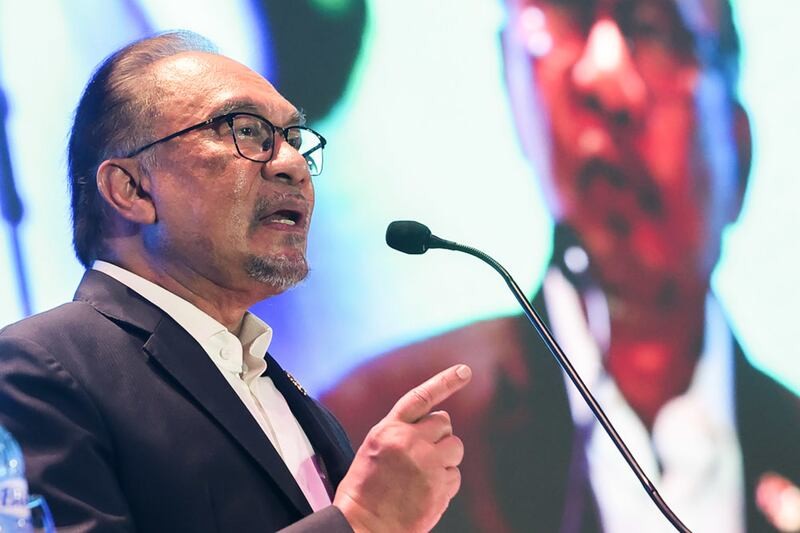Malaysia will allocate 25 billion ringgit (U.S. $5.3 billion) to train 60,000 local engineers and expand the domestic semiconductor industry, Prime Minister Anwar Ibrahim said Tuesday, as the country seeks to become a neutral, global chip-making hub amid U.S.-China tensions.
The Southeast Asian nation is also looking to capitalize on chip companies diversifying their supply chains with a “China Plus One” strategy, where companies complement production in China with investment in other countries, to avoid a repeat of the demand shock caused during the COVID-19 pandemic.
During a speech at a trade show in Kuala Lumpur, Anwar lobbied for Malaysia as a non-partisan hub for top chipmakers amid rising concerns that U.S.-China tech battles would disrupt supply chains for a range of products, from smartphones to electric vehicles.
"I offer our nation as the most neutral and non-aligned location for semiconductor production, to help build a more secure and resilient global semiconductor supply chain," Anwar said at Semicon Southeast Asia 2024.
“Geopolitical dynamics aside, a robust multinational semiconductor production remains vital for humankind’s survival, particularly as we are running out of time in our climate action and risk mitigation.”
Anwar said his administration planned to create 10 local companies for semiconductor design and packaging, with projected revenues of 1 billion to 4.7 billion ringgit ($210 million to $1 billion). Nurturing an additional 100 semiconductor-related companies with revenue close to 1 billion ringgit ($210 million) would also create higher wages for Malaysian workers, he said.
“We have a strong capacity to diversify and move higher in the value chain towards even more high-end manufacturing, semiconductor design and advanced packaging,” he said.
“We will court at least 500 billion ringgit [$106.5 billion] of investments with domestic direct investment focusing on integrated circuit design, advanced packaging and foreign direct investment focusing on wafer fabs and manufacturing equipment,” he said referring to the production of semiconductor fabrication.
Anwar did not provide a timeline for these targets, but Tengku Zafrul Aziz, minister of Investment, Trade and Industry Malaysia, has set targets to achieve its semiconductor ambitions over the next five to 10 years.
In April, Anwar announced a plan to build Southeast Asia’s largest integrated circuit design park to shift focus from chip assembly to high-value work and attract global tech companies and investors.
Malaysia controls about 13% of global chip packaging, assembly and testing services, according to the Malaysian Investment Development Authority, making it the world's sixth-largest exporter of semiconductors.
Major investments in Malaysia’s semiconductor sector recently include expansions by the U.S.-based Intel and Germany’s Infineon, and AI infrastructure development by Nvidia and Microsoft, according to the authorities.
In August 2023, Infineon Technologies announced an investment of up to 5 billion euros ($5.4 billion) over the next five years to build the world's largest 200-mm silicon carbide power fabrication facility in Malaysia.

Zafrul, the investment minister, said Malaysia’s stance on “geopolitical neutrality, coupled with its adept investment diplomacy” strengthened its global position.
In August 2022, U.S. lawmakers passed the CHIPS and Science Act, authorizing incentives such as subsidies and tax breaks to boost advanced semiconductor production.
Two months later, Washington imposed broad export restrictions on chips and chip-making technology to limit China's "ability to both purchase and manufacture certain high-end chips used in military applications and build on prior policies, company-specific actions, and less public regulatory, legal, and enforcement actions …"
The U.S.-China tech war and the China Plus One strategy has presented a golden opportunity for Malaysia’s economy, said Wong Siew Hai, president of Malaysia Semiconductor Industry Association.
“In 2021, Malaysia grew 18% in semiconductor export value and in 2022 we grew 30%. The export value was 595 billion ringgit ($126.8 billion) in 2022,” he told BenarNews.
“In 2022, the global semiconductor market grew 3.3% but Malaysia grew 30%, so what that means is that the China Plus One strategy is actually working. … Malaysia is one of the biggest beneficiaries of that shift,” he told BenarNews.
Additionally, said Samuel Tan, a property consultant, Malaysia’s friendly relations with China and the West were key factors in making it an attractive investment hub for companies relocating their manufacturing facilities.
“Malaysia offers a conducive environment for companies due to factors such as a skilled talent pool, robust legal frameworks, political stability, investment-friendly policies, and a supportive ecosystem of small and midsize enterprises,” the executive director of KGV International Property Consultants told BenarNews.
“The country’s multilingual capabilities, low currency rate for competitive exports, and ability to diversify risks further enhance its attractiveness for establishing production hubs.”
China’s approach
Meanwhile, even Chinese firms are applying the China Plus One strategy, according to analyst Collins Chong Yew Keat of the University of Malaya.
“While U.S. and European firms are keen to diversify out of China, Chinese firms are doing the same – to avoid the aftermath of U.S. sanctions – and locating facilities outside of the mainland as part of the China Plus One,” he told BenarNews.
“Concerns on the long-term durability of Taiwan’s prowess in the semiconductor sector with increasing geopolitical and security volatilities have also fueled further focus on Malaysia.”
Collins said Malaysia, Indonesia, Thailand, Vietnam and India stand to be the potential front-runners or popular destinations for companies implementing the plus-one strategy.
Still, Malaysia has the “right ingredients and advantages” to be the top pick of these countries for chipmakers firms, he said.
